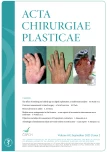-
Medical journals
- Career
Addressing the obesity challenge in plastic surgery – the role of liraglutide
Authors: K. Staněk 1,2; Richard Billich 3; O. Měšťák 1
Authors‘ workplace: Department of Plastic Surgery, University Hospital Bulovka and First Faculty of Medicine, Charles University, Prague, Czech Republic 1; Boston Children’s Hospital, Harvard Medical School, Boston, Massachusetts, USA 2; SANUS Sanatorium, Hradec Kralové, Czech Republic 3
Published in: ACTA CHIRURGIAE PLASTICAE, 65, 2, 2023, pp. 86
Category: Letter do the Editor
doi: https://doi.org/10.48095/ccachp202386Dear Editor,
As obesity rates continue to rise globally, health risks and implications for surgical outcomes cannot be overlooked. Obesity increases mortality and morbidity and impairs health-related quality of life. Particularly concerning is that obese patients undergoing plastic surgery face a significantly higher risk of complications (11.3% absolute risk increase), particularly deep vein thrombosis and pulmonary embolism, and reoperations [1].
These findings, summarized in a recent meta-analysis, underline the urgent need for plastic surgeons not only to understand obesity's impact on surgical outcomes but also to acquaint themselves with obesity treatment modalities, ranging from behavioural interventions and pharmacotherapy to bariatric surgery.
We strongly believe that plastic surgeons should take every precaution to minimize surgery-associated risks of aesthetic and reconstructive elective procedures, and preferably avoid operating on patients with obesity altogether. As plastic surgeons, we are obligated to explain all risks to patients and offer them a solution, when possible. In the authors’ practice, the pharmacological treatment of obesity prior to surgery has been beneficial in decreasing risks and enhancing cosmetic results.
Our focus is primarily on liraglutide, a glucagon-like peptide-1 analogue proven effective in weight reduction (5.4% weight loss over a 12-month period) and weight maintenance [2]. Liraglutide plays a significant role in satiety signalling and suppresses additional energy intake, making it a preferred option in our practice for preoperative obesity treatment before plastic surgery procedures.
Administered subcutaneously at any time of the day, liraglutide costs approximately 5 EUR (130 CZK) per day. It is indicated for weight management in patients with an initial body mass index ≥ 30 kg/m² or ≥ 27kg/m² with one or more weight-related comorbidity, in combination with increased physical activity and a reduced-calorie diet. The optimal dose for weight loss has been established as 3.0 mg/day, maintaining an acceptable safety profile [3].
To manage adverse effects such as nausea and vomiting, a gradually escalating dosing scheme should be adopted. Patients should start at a dose of 0.6 mg/day, adding increments of 0.6 mg/day each week until reaching the 3.0 mg/day maintenance dose. The incidence of nausea is highest during the dose-escalation period but drops below 10% after week 12 [4]. Liraglutide, however, is contraindicated during pregnancy, in patients with personal or family history of medullar thyroid carcinoma or multiple endocrine neoplasia type 2, and in those with severe renal or hepatic impairment.
The literature supports the use of obesity pharmacotherapy, like liraglutide, for at least 12 months, showing a substantial percentage of weight loss. A phase 2 dose-ranging study and a series of four SCALE clinical trials provided further evidence for liraglutide’s effect on achieving and maintaining weight loss, and notable effects on improving glycemic parameters and cardiometabolic health [5].
In conclusion, obesity poses a significant challenge in the realm of plastic surgery for achieving safe, optimal aesthetic, and functional outcomes. As medical practitioners, we should consider the inclusion of obesity pharmacotherapy in our treatment strategies to enhance surgical results, thus offering our patients more comprehensive care.
Sincerely,
Kryštof Staněk, MD
Roles of authors: Kryštof Staněk – contributed to the conception, critical review of the literature, and drafting of the letter; R. Billich and Ondřej Měšťák – substantially contributed to the drafting and revising of the work.
Kryštof Staněk, MD
Department of Plastic & Oral Surgery
Boston Children’s Hospital,
Harvard Medical School,
300 Longwood Avenue, Boston, MA
Sources
1. Bigarella LG., Ballardin AC., Couto LS., et al. The impact of obesity on plastic surgery outcomes: a systematic review and meta-analysis. Aesthet Surg J. 2022, 42(7): 795–807.
2. Tak YJ., Lee SY. Long-term efficacy and safety of anti-obesity treatment: where do we stand? Curr Obes Rep. 2021, 10(1): 14–30.
3. Astrup A., Rossner S., Van Gaal L., et al. Effects of liraglutide in the treatment of obesity: a randomised, double-blind, placebo-controlled study. Lancet 2009, 374(9701): 1606–1616.
4. Pi-Sunyer X., Astrup A., Fujioka K., et al. A randomized, controlled trial of 3.0 mg of liraglutide in weight management. N Engl J Med. 2015, 373(1): 11–22.
5. Blackman A., Foster GD., Zammit G., et al. Effect of liraglutide 3.0 mg in individuals with obesity and moderate or severe obstructive sleep apnea: the SCALE Sleep Apnea randomized clinical trial. Int J Obes (Lond). 2016, 40(8): 1310–1319.
Labels
Plastic surgery Orthopaedics Burns medicine Traumatology
Article was published inActa chirurgiae plasticae

2023 Issue 2-
All articles in this issue
- Healthy and functional hand – the miracle of evolution
- The effect of smoking and elderly age on digital replantation – a multivariate analysis
- Outcome measurement in hand surgery – a brief overview
- Electrical burns in adults
- Median nerve entrapments in the forearm – a case report of rare anterior interosseous nerve syndrome
- Objective and subjective assessment of Dupuytren's contracture
- Advantages of simultaneous radial nerve and tendon reconstruction – a case report
- CORRIGENDUM
- Data on paediatric burn mortality from a single centre over 32 years
- Roman Bánsky (ed.): Clefts
- Addressing the obesity challenge in plastic surgery – the role of liraglutide
- Acta chirurgiae plasticae
- Journal archive
- Current issue
- Online only
- About the journal
Most read in this issue- Electrical burns in adults
- Objective and subjective assessment of Dupuytren's contracture
- The effect of smoking and elderly age on digital replantation – a multivariate analysis
- Median nerve entrapments in the forearm – a case report of rare anterior interosseous nerve syndrome
Login#ADS_BOTTOM_SCRIPTS#Forgotten passwordEnter the email address that you registered with. We will send you instructions on how to set a new password.
- Career

